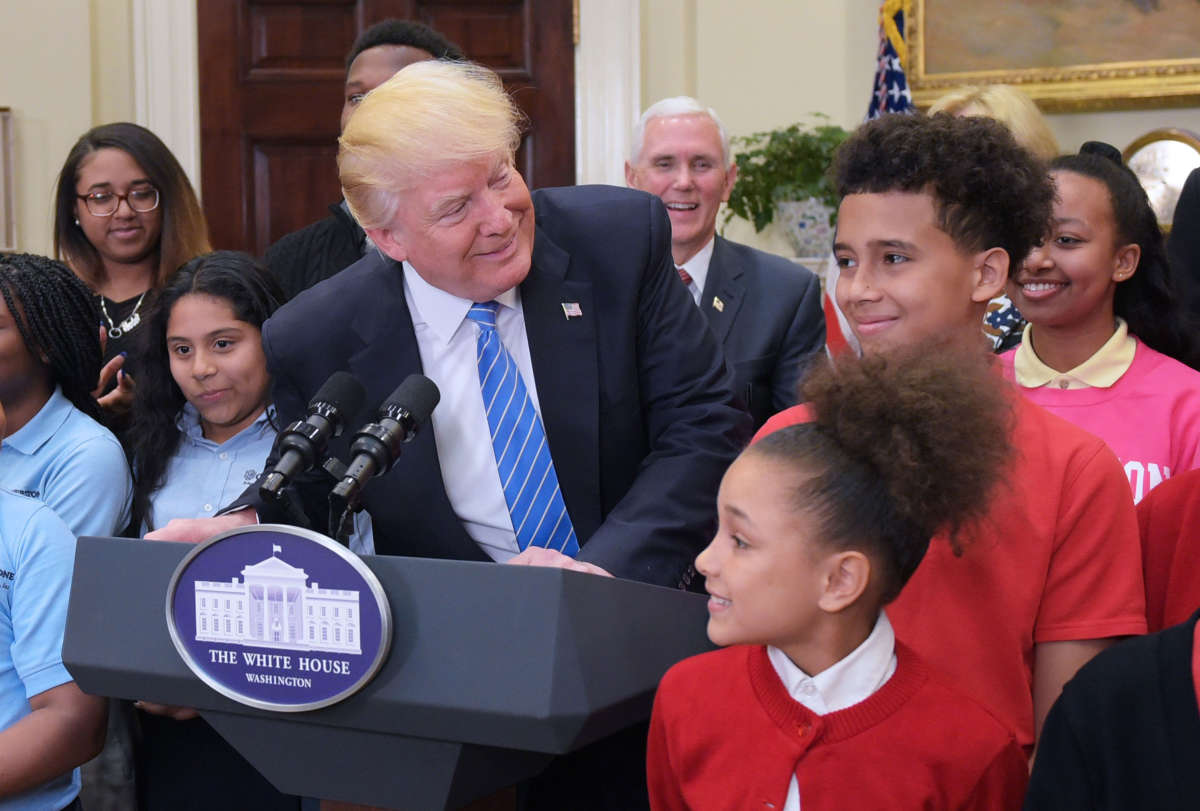As the presidential election campaign picks up, almost every top candidate has released a plan for higher education that addresses college affordability and student debt issues. But there’s only one candidate who’s already in the White House — Donald Trump — and last week he released his plan in the form of a proposed education budget for fiscal year 2021.
If Congress were to approve it, some higher education experts say, low-income students would be so financially squeezed that college might be out of reach.
“This budget overall makes college more expensive for students,” said Wil Del Pilar, vice president of higher education policy and practice for The Education Trust, a nonprofit organization that advocates for students of color and those from low-income households. “It eliminates significant supports that make a difference in whether students go or don’t go, and whether they actually end up finishing.”
The likelihood of the budget passing in Congress seems low, since President Trump has proposed similar cuts for past fiscal years and they have been rejected. But the budget does give a sense of the president’s views on higher education.
“Budgets are a reflection of what you value and it’s clear that this administration doesn’t value affordability for low-income students and students who struggle the most to pay,” Del Pilar said.
The president’s supporters argue that the proposal reflects a desire to reduce the federal role in education and tighten spending on financial aid programs.
Trump’s 86-page education budget, which also includes a number of proposals for K-12 education, calls for eliminating the Federal Supplemental Educational Opportunity Grant, reducing the allotment for Federal Work Study by more than half, to $500 million (which he has asked for before); and distributing only unsubsidized loans for undergraduates.
“The cuts that were proposed to the student aid programs would disproportionately impact low-income students,” said Megan Coval, vice president for policy and federal relations at the nonpartisan National Association of Student Financial Aid Administrators. “Those programs, the Federal Supplemental Educational Opportunity Grant, which we call SEOG, and Federal Work-Study and subsidized loans, are utilized primarily by our lowest income students.”
In the 2016-2017 school year, about 1.5 million students received FSEOG aid, and the average award amount was $665, according to a 2019 report from the Student Financial Aid Administrators’ association. About 617,000 students had Federal Work-Study jobs, which came with an average award of $1,759.
As Coval noted, this money is for students who are working with a small budget, or no budget at all, to finance their education. In the 2016-2017 school year, just under 68 percent of financially dependent students who received FSEOG came from households making less than $30,000 a year. Among dependent work-study students in undergraduate education, 44 percent were from households making less than $42,000 a year.
With subsidized federal loans, a student’s indebtedness is reduced, said Coval. The Department of Education pays the loan’s interest while a student is in school.
Parts of the budget are promising, some higher education experts said, such as the expansion of eligibility for Pell Grants, which also serve low-income college students. Trump proposes that incarcerated students who will likely be released within five years and who enter programs that will prepare them for high-demand jobs be eligible for the grant. Del Pilar, though, said this recommendation is too vague.
“How are you defining well-paying jobs and who’s determining what these high-demand fields are?” he said.
The president also wants students in “high-quality,” short-term postsecondary programs that will lead to a license, certificate or other credential in a “high-demand field” to be eligible for Pell grants. Without proper guardrails to ensure that these programs are high-quality, unscrupulous institutions could take advantage of students, Del Pilar said.
Several organizations have said the budget would hurt far more students than it could help, including The Center for American Progress, the Association of Public and Land Grant Universities and the Institute for Higher Education Policy.
Others say that tightening the Department of Education’s purse strings will benefit all. Not surprisingly, Secretary Betsy DeVos applauded the budget proposal. In a statement, she championed the recommendations to reduce the “outsized Federal role in education,” and to reorganize the Office of Federal Student Aid, which disburses federal loans.
“FSA has, in recent years, essentially ballooned into a $1.5 trillion bank that has outgrown its current governance structure,” she said. “Students and their families deserve better from FSA.”
This story about proposed education budget was produced by The Hechinger Report, a nonprofit, independent news organization focused on inequality and innovation in education. Sign up for our higher education newsletter.
Join us in defending the truth before it’s too late
The future of independent journalism is uncertain, and the consequences of losing it are too grave to ignore. To ensure Truthout remains safe, strong, and free, we need to raise $43,000 in the next 6 days. Every dollar raised goes directly toward the costs of producing news you can trust.
Please give what you can — because by supporting us with a tax-deductible donation, you’re not just preserving a source of news, you’re helping to safeguard what’s left of our democracy.
